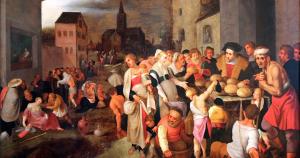 Mercy cannot be demanded. Mercy is a gift, not a debt. Mercy is what God gives those that err, but turn even a bit towards Him.
Mercy cannot be demanded. Mercy is a gift, not a debt. Mercy is what God gives those that err, but turn even a bit towards Him.
When we receive mercy, the joy is unexpected, wonderful, good news. Some good news we create: our plans come to fruition. That is happy, but many events are not under our control and when life works out beyond our plans or even despite our failures, this is also joyous. Our first birth was very difficult and Hope was sick after delivery. We do not know still what was wrong, only that she grew sicker over two days. One day she was well again and this was so good. Our baby nuzzled up to his mother and all was gloriously well: splendid mercy.
Mercy is so happy, so joyful, only comedy can prepare us to hope. The Comedy of Errors, Shakespeare’s shortest, jolliest, comedy is divine mercy defeating humanity’s error.
The Comedy of Errors has many levels, yet fundamentally it is a divine comedy. The world works out in the play as the world should and always would if people did not choose badly. When we watch such theater, and laugh at the absurdity of human choices, we are healed. Nobody in the play communicates, they assume, posture, do what they think will be socially prudent. This error leads to a multiplication of error to comedic effect.
God takes the error that could produce a tragedy and makes a comedy.
God stands ready to maximize goodness, truth, and beauty, but that entails justice. The people in Comedy make foolish mistakes, but also sin, visiting a courtesan is not good for a marriage. Nature is cruel, but people are suspicious, fail to communicate, and are foolish.
We err. God takes our errors and over time makes of it a comedy of errors: history ends in a wedding between the God-man and His bride, God and humanity become one. Many events, tragic in isolation, become (almost) comic in the context of a world where all is well.
The indentured servants, the two twins named Dromio, are treated badly. They are born under the same star as the aristocratic twins, but class keeps them down. When one is released from indenture, set free, this is one of the first actions that begins bringing unexpected mercies and joys.
Within this hour I was his bondman sir,
But he, I thank him, gnaw’d in two my cords:
Now am I Dromio and his man unbound.
This act does not cause the mercy to come, but puts the characters in position to receive mercy. The servant-master relationship is disordered, stuck in old patterns, but the conclusion gives hope and good cheer.
The marriage in the play is troubled, not hopeless, but not loving. The “errors” of identification make obvious the problems: the wife is in love, but treated badly, the husband is selfish, given to vice. One great mercy is reunion of this man with his mother, now an abbess, who will have little tolerance for his failures. Deprived of mother and father, Antipholus of Ephesus does not love well. Shakespeare gives us hope that he will be guided by his father and corrected by his mother. He needs both.
The abbess is the mother of the twins, and she has been in travail, like the Mother of God for thirty three years in travel with her Son:
Thirty-three years have I but gone in travail Of you, my sons, and till this present hour My heavy burden ne’er delivered. The Duke, my husband, and my children both, And you the calendars of their nativity, Go to a gossips’ feast, and joy with me.
Jesus was born in Bethlehem, but Mary mothered him for a lifetime through the cross to the upper room at Pentecost. Thirty-three years she was in travail, a sword piercing her heart, but then came joy and feasting as her Son was delivered from death. She was the mother of God: heard the Word of God and believed.
Joy came as a severe mercy.
Shakespeare gives us this story with a light touch. He begins with the father sentenced to death and hides the mother in an abbey. Nothing is too serious, yet while we laugh we are reminded the world of our errors is often redeemed, all is redeemed in the end.
We will come to an abbey, if we persist, and find brothers, mother, and Father.
Or so Shakespeare thinks.
Thank God.












